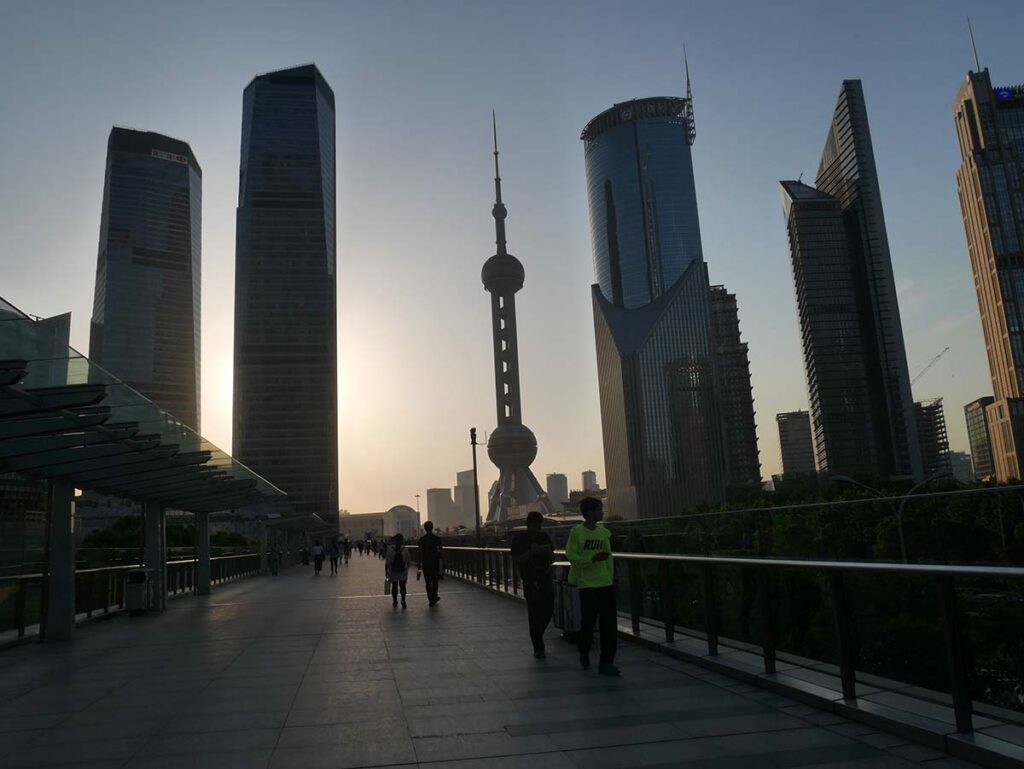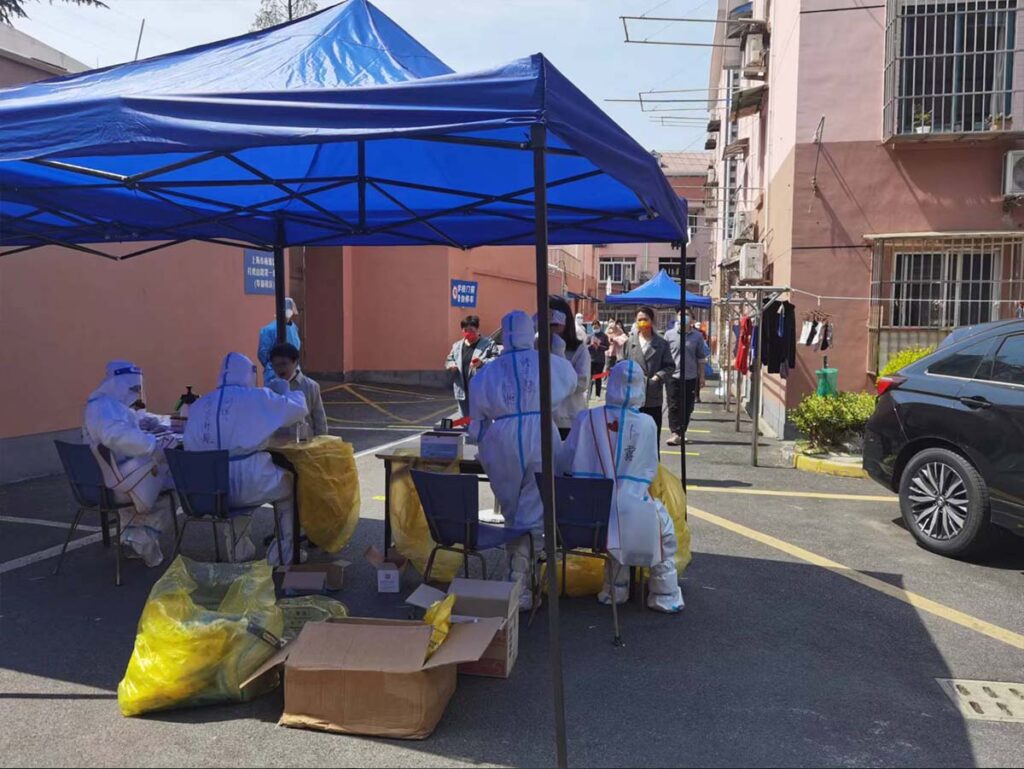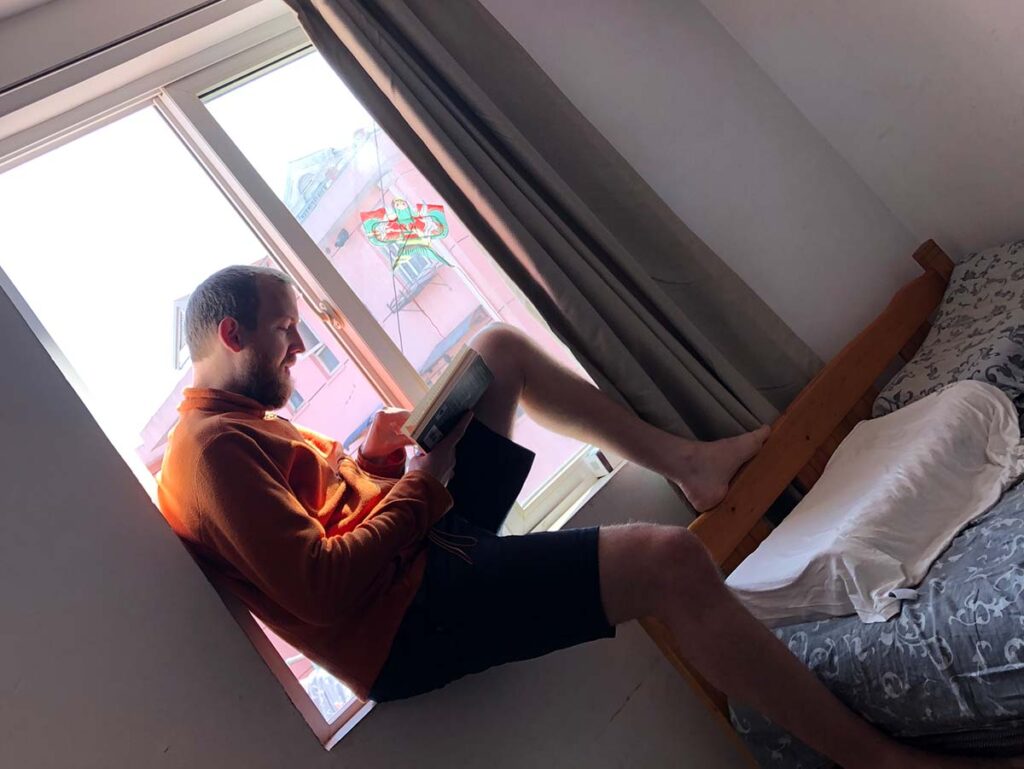Mandarin version by Misaka Clover | Japanese version
The first time I came to Shanghai, in 2017, I was amazed by how developed the city was. My only other Asian experience was Mumbai, and compared to that, Shanghai was clean and organized. I was amazed by how you could pay for a laundrette with your phone, or sharing bicycles on the street, food delivery within 30 minutes, skyscrapers that had mostly all been built in the decade. And you could say a lot of things about the political environment but people seemed incredibly hard-working, optimistic, and GDP in China had grown incredibly hard for forty years straight. And Shanghai was the shining example of that.
That Shanghai disappeared slowly, then all at once — the way some people fall in or out of love. We’re now on the ninth day of our lockdown, having only left the house for a few minutes for four PCR tests — and once because the security guard of our compound, unlike other deliveries, refused to bring the water I ordered to our door, saying it was too heavy. (Yes, I bought sixty liters, not just for ourselves.)
The ninth day, but we’re lucky — some people have been inside for over a month now. We cannot freely choose our recipes because food delivery is really difficult, but we’re lucky — some people are really down to just instant noodles or are lacking medicine. The city is sending rations, but we got one small package of vegetables once during nine days. And it’s not just food. Parents cannot print their kid’s homework because their printers have run out of ink, people are running out of cooking oil, laundry soap, diapers, period pads, toilet paper, or medicine (even shortages of xanax are mentioned).
We’re working from home, but again we’re lucky — many people (because of the nature of their job) cannot and see their bank account go to zero, or their own business go bankrupt.
Maybe it was always under the surface. Baoans (security guards of living compounds, from the Chinese word 保安) are not the friends we thought they were, and videos are circulating of them slaying a dog of an owner who tested positive, or intimidating citizens through a microphone even though they’re standing next to them. Together with the 居委会Jūwěihuì (Neighborhood Committee), they decide which orders will be delivered to your house; vegetables, meat and staples are ok, but drinks and fruit aren’t.
It’s not that baoans have changed. Baoans have always been following rules and orders to the fine print, and now those orders have changed — and it’s evident they still cannot provide an inch of flexibility. Baoans used to be a bit half-witted but always friendly. With the city lockdown, they’re suddenly in charge of things, no longer friendly but still half-witted. No longer do they decide over where to collect garbage or park your car; they’re sealing doors and refuse people to leave the compounds for hospitals, they’re suddenly in charge over life and death decisions.
Meanwhile, state media is busy with debunking myths. Two weeks ago, two people were arrested for spreading rumors that Shanghai would go into lockdown — before it did. People are finding out that state media exists not for accurate news, but mainly to spin reality into a narrative that fits the powers higher up.
Shanghai, the place that once touted luxury pet hotels or superficial wanghong restaurants for people to take selfies. Now we see quarantine hospitals (they’re not really hospitals, more like hangars) with vile conditions. I do not fear covid, but I do fear a positive test and the subsequent inhuman quarantine places, sharing a toilet with hundreds of others, no shower, and no privacy for two weeks.
Not all is bad. There are many stories of ordinary people helping each other, and also for me the people in my building have been incredibly nice. We received disinfection alcohol from a neighbor, and we gave carrots to another. Other neighbors are asking who has cigarettes, diapers, or cooking oil. Groups have been set up to do bulk buying and even though many orders failed, some have come through.
But the whole day we’re on our phones to see if we can snatch an order on a delivery app or a WeChat group, plus we’re on Reddit or Twitter or Telegram to see videos that aren’t shared on WeChat. The head of our building will send messages and updates and want a “收到” from everyone (meaning ‘received’), and colleagues also are sharing their dismay or memes. Productivity is low, but we’re the lucky ones. At least we can still work, we have something else on our mind, some meaning — and I spread out the workload from five days across the weekend to compensate.
My body is aching for sport; to cycle, run, and walk in a park. But we’re the lucky ones still. Every morning I sit on the window sill on the Northeast side of our apartment to catch some sunlight, and in the afternoon I hang out the bathroom window to the Northwest to catch some sunshine there. And when hanging out of the window, we can chat with the neighbors. I’ve come to know their faces, as well as the way they hang their laundry. There is, I must say, a certain romance to watching out of the window at night with candles on and Miles Davis playing on the speaker — but we may soon have to stop this ritual for mosquito season is upon us and we cannot order a mosquito net online.
Our apartment looks over a tiny square with a tiny pavilion. The building across us has had a positive case, so their gate has been locked shut with a bicycle lock. There’s a guy (or girl?) in a hazmat suit who sleeps under the pavilion and watches his or her phone the whole day, only being tasked (I guess) with opening the lock in case of a fire or emergency. The hazmat guys & girls are called ‘dabai’s’ (from 大白), which means ‘Big white’ but is also the name of Baymax in Disney’s Big Hero 6 movie. In terms of intelligence, they’re a level up from baoans as they’re more likely to be young, educated and from other provinces — send to Shanghai to help — but like baoans, there have also been plenty of videos circulating of violence from dabai’s. They are not seen as the heroes from Wuhan two years ago, but maybe that’s because Wuhan was a tragedy of the unknown virus, while this lockdown feels like chasing a dream of zero-covid. Or maybe it’s just because we are in this lockdown; had we been in Wuhan, we would have seen those dabai’s in another light as well.
Sometimes one of the people in the locked building yells to the dabai or anyone who passes, to hand over the vegetables she has ordered and who are now perishing at the locked gate of their building. But people don’t have the key and the ones who do may not necessarily care. In the evening their gate opens, and a group of dabai’s enters to do PCR tests on their doors — they’re not allowed to go out and do PCR tests like the rest of us.
This is the biggest, richest, most international city of China and people are starving, without medicine, and without freedom. Parents are separated from their children, the military is on the streets, and Shanghai’s optimism has ground to a halt. We’re back to the bottom of Maslow’s pyramid. I’m sure Shanghai will bounce back, but will its pride? For two years, foreigners have heard how everywhere outside of China (国外 ) was such a mess in terms of covid infections and how safe China was. This makes this whole lockdown feel drenched in identity politics, because letting go of zero covid forces China to also let go of that narrative.
In the Netherlands, like the United States, you can be a patriot even if you express your dismay with your country. In China, this is not accepted, you must love it unconditionally and if you critique it you’re seen as a traitor. I say F that. I love you Shanghai, but not in this way. This is like seeing a dear friend fail. Take me back to stupid overpriced meals that are designed to be photographed, not eaten. Take me back to karaoke booths on the subway station. The late night metro. The French phoenix trees with boys & girls posing. The aunties from all over China visiting the Bund, the seniors making music in the park, the overcrowded Starbucks, the hotpot restaurants where you have to queue for over an hour. Please Shanghai, show me you’re the shining example of the best that China has to offer. Quickly please, because my legs are sour.








